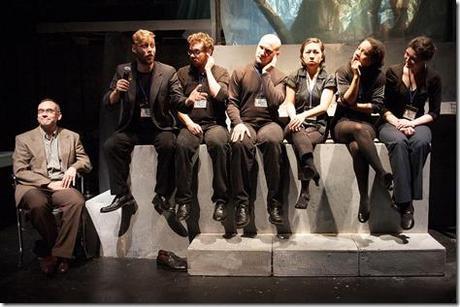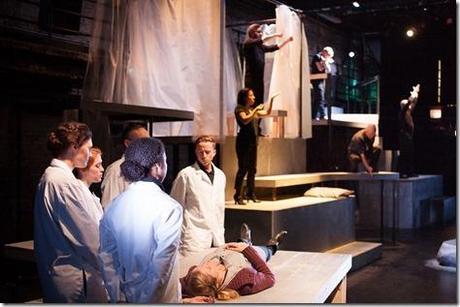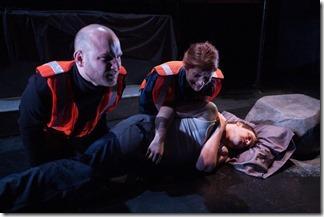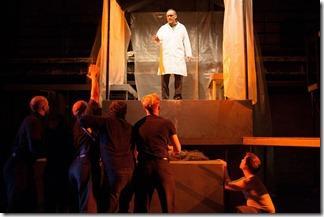
Mnemonic
Written by Complicite
Directed by Brandon Ray
DCASE Storefront Theater, 66 E. Randolph (map)
thru Oct 5 | tickets: $15 | more info
Check for half-price tickets
Read review
For a play about memory, this one’s forgettable

Red Tape Theatre presents
Mnemonic
Review by Clint May
Critical praise was lavished on Mnemonic when it debuted, and it even went on to win several awards. Red Tape Theatre—no longer in their gymnasium space at St. Peter’s Episcopal Church—can’t reignite whatever spark it was that made the original so memorable. Like the architectural style of the same name, so-called “postmodern” theater didn’t age well, and it especially doesn’t translate well when divorced from a charismatic creator. Reading some of the reviews from around its debut, I can only imagine that whatever made this special was the ‘wow’ effect of bodies in movement and audio/visual panache. It’s difficult to imagine that a script with such muddy characters and an overbearing metaphor was the source of the accolades. Perhaps no one but Complicite’s Simon McBurney could direct this successfully, but some shows just don’t stand the test of time no matter how good they were in their inception.

Ostensibly, finding her father will give the girlfriend’s life meaning because she can’t live in the present or the future without her past. We are not given details as to exactly why this would be true for her as she’s just in service to the story, not herself. There are lots of things people don’t know about their past and they go on living just fine, so why she felt compelled to leave her life behind to seek him out is a rather critical missing point. Was her mother’s death some kind of trigger? Why do we care? Her travels throughout Europe have a sort of “Everything is Illuminated” quality as she gathers clues both physical and intangible. (A pair of shoes with a worn heel show he is a pianist because that’s where he wore it down pushing the pedal.) Elsewhere the accoutrements of the Iceman are analyzed in the same fashion as scientists try to suss out the details of how his naked body came to rest on the mountainside 5,000 years ago. Like the far superior A History of the Universe, the temporal traveler gives a vast sense of scale to our own lives (old gag for museum lecturers: “Good evening ladies and gentleman, or, as I like to call you, ‘future exhibits’”). There’s no plot per se, just a lot of moments and statements about waking up and asking what it means to be naked.



Since we never meet the couple before their dissolution, we have zero emotional involvement with their attachment. They are just broadly painted images of emotional states, not finely honed characters unto themselves. The harrowing story of the Iceman ends up being far more fascinating, but only in the sense that an episode of National Geographic can be fascinating. Although two of the three stories are less than compelling, it also appears to be a matter of Red Tape biting off more than it can chew. Whatever technical whizbangery the original was able to conjure to conceal the script’s weaknesses, Red Tape’s production comes off too small-scale and economical despite the vast space afforded by DCASE. Thirty-eight scenelets and no emotional connection to tie them all together, only a few half-baked philosophical intrigues (and those heavy-handed at that) do not an intriguing show make. If you made a drinking game out of every time they make an overt connection between the iceman and the lovers, you’d be dead of alcohol poisoning in 90 minutes. Drinking anything at all would be ill-advised as the show’s two-hour intermissionless run time violates Hitchcock’s first rule in relation to bathrooms. Even the humor falls flat, but at least there gets to be some good broad insight about annoying Americans and snooty Europeans.
From that opening pablum to an utterly unsatisfying denouement that includes, among other things, an incredibly tedious science panel discussing Ötzi, Mnemonic is an unfocused mess with potentially interesting ideas scattered about like so much unhewn stone. For the life of me I can’t see what the big deal about memory and origins so stressed at the outset ever was to the middling stakes we’re asked to invest in. What a shame—such a large and talented cast thrown into such a facile work. Certainly an ignominious opening for Red Tape’s latest season.
Rating: ★½
Mnemonic continues through October 5th at DCASE Storefront Theater, 66 E. Randolph (map), with performances Thursdays-Saturdays at 7:30pm, Sundays 2pm. Tickets are $15 (Thursdays are pay-what-you-can), and are available online through Tix.com (check for half-price tickets at Goldstar.com). More information at RedTapeTheatre.org. (Running time: 2 hours, no intermission)

Photos by Austin D. Oie
artists
cast
Meghan Reardon (Alice), Chris Carr (Virgil), Robert L. Oakes (Spindler), Sarah Grant, Krista Taylor, Stephanie Shum, Emma Ladji, Jake Szczepaniak, Pavi Prozcko, David Cady Jr., David Giannini, Gage Wallace (ensemble), Charlotte Cannon (Alice u/s), Sean Wiberg (Virgil u/s)
behind the scenes
Brandon Ray (director), Josh Johnson (asst director), Alan Weusthoff (technical director), Krista Mickelson (production manager), Becky Warner (stage manager, props design), Emily Guthrie (scenic design), Mike Durst (lighting design), Izumi Inaba (costume design), Liviu Pasare (projections design), Spencer Batho (sound design), Gordon Granger (special props design), Lindsay Bartlett (dialect coach), Don Markus (video production), Austin D. Oie (photos)


14-0906

